Introduction: In this article, Scott Phillips searches old newspapers to learn more about Confederate General Robert E. Lee’s surrender to Union General Ulysses S. Grant that effectively ended the American Civil War. Scott is a genealogical historian and owner of Onward To Our Past® genealogy services.
All of us have studied it, memorized the date, and (if we’ve been lucky) visited the place where it occurred: Appomattox Court House, Virginia, the site of Confederate General Robert E. Lee’s surrender to Union General U. S. Grant, effectively ending the United States Civil War on 9 April 1865.
Although General Lee’s surrender was 149 years ago now, that momentous historical event still seems fresh in the public’s mind—and it must have been incredible news to our American ancestors all those many years ago.
I decided to take a look in GenealogyBank’s online Historical Newspaper Archives to see how the news of General Lee’s surrender was announced via the nation’s newspapers, and learn what has happened to Appomattox Court House since that fateful day.
Just six days before the Confederate capital of Richmond, Virginia, surrendered, this Richmond newspaper was still giving its readers news about the war.
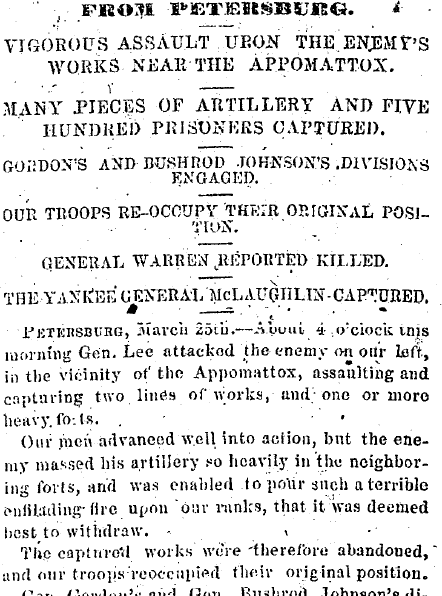
Just days before Generals Lee and Grant were to meet at Appomattox, the Battle of Five Forks was raging as reported in this Albany newspaper. One of my ancestors, Captain James Ham of the Pennsylvania Cavalry, was mortally wounded in this action and died five days before Lee’s surrender. I wonder how his family received the news about the war’s end, coming so soon after they had received word of his death.
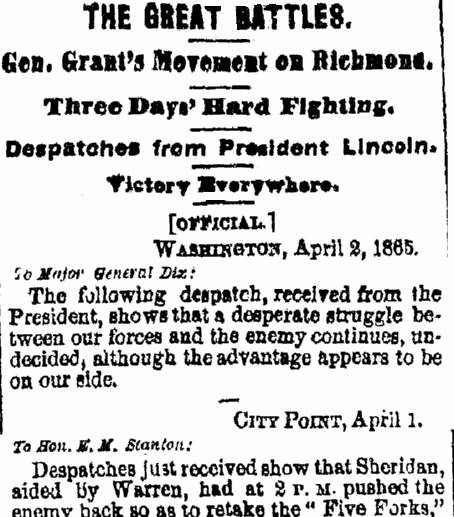
After Lee surrendered on April 9, it didn’t take long for word to spread across America, as you can imagine.
The headlines of this Boston newspaper article say it all.
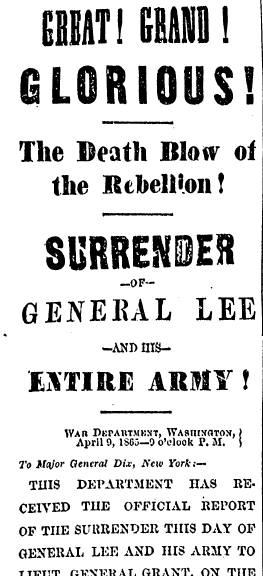
That same day and in the same city, readers of this Boston newspaper saw this article, including this paragraph:
The joy of our population this morning, as the intelligence of the surrender of Lee’s army spread, hardly knew bounds. Men embraced each other with the most extravagant demonstrations of feeling; staid, quiet citizens forgot their equanimity for the moment and found themselves cheering in the streets for Gen. Grant and the Potomac Army; workmen in shore gave voice to a joyous outburst of patriotic exultation, and everywhere the same accordant strains of heartfelt rejoicing were heard.
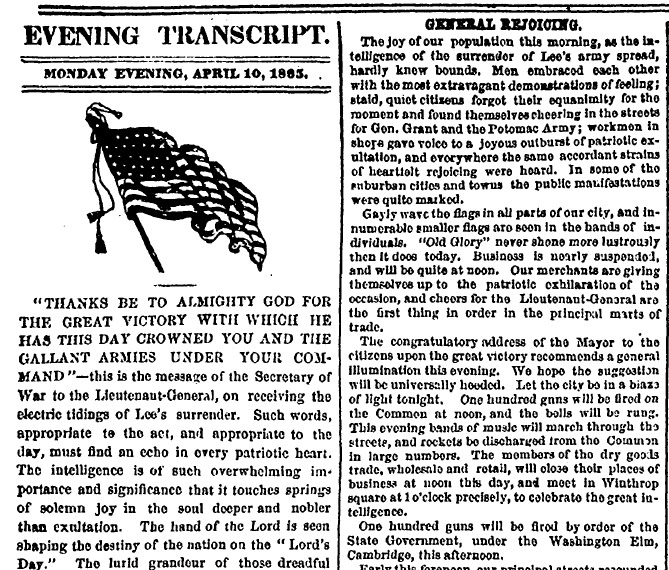
Readers of a New York newspaper saw these headlines.

On the same day and across the country in California, this San Francisco newspaper reported the important news.
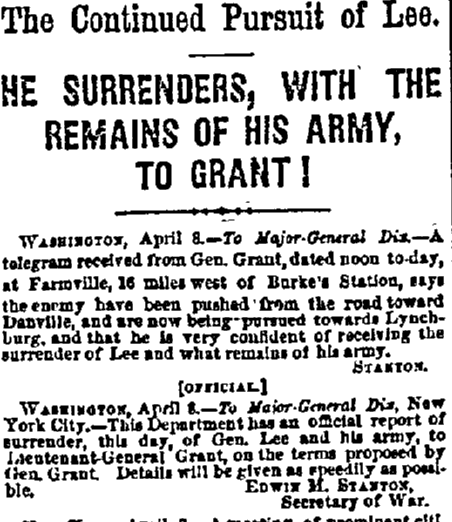
Twenty years later, as you can see in this 1885 Aberdeen newspaper article “The Interesting Story of Appomattox Retold,” the details of Lee’s surrender to Grant were still being reported. I remember as a young student reading these types of Civil War stories and realizing for the first time that Appomattox Court House was the name of a town, and that Lee and Grant had actually met in the home of the Wilmer McLean family.
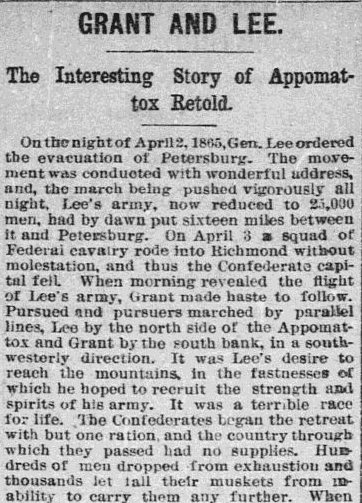
The fortunes of Appomattox Court House waned after the war, as you can read in this 1884 New York newspaper article. It reports that the town was almost deserted and the McLean home had been:
…taken down, brick by brick, for removal to the World’s Fair, but for some reason the plan was not carried out, and the bricks and timbers are still stored in the vacant houses in the neighborhood.
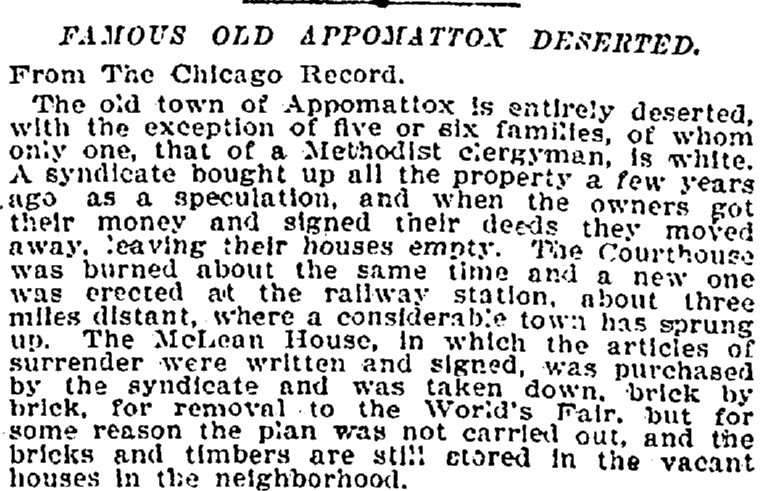
Luckily for all of us, as you can read in this 1903 Dallas newspaper article, bills had been introduced in Congress to provide funding to buy and save the historic McLean house in Appomattox before it was sold to a Chicagoan who planned to move it there and use it as his residence.
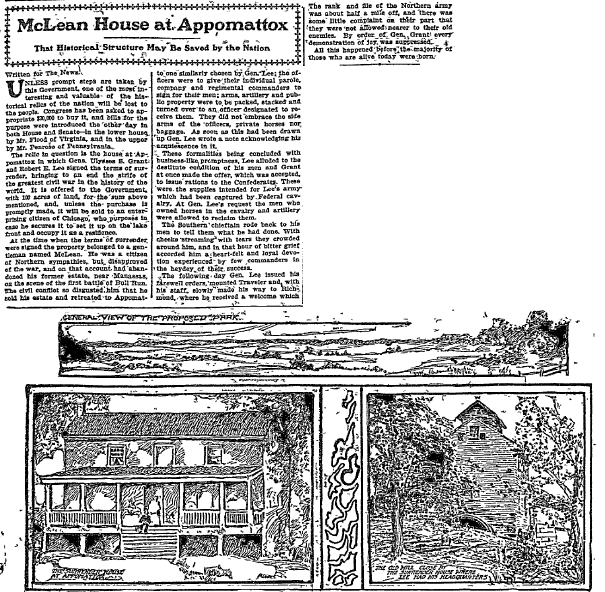
And of course as a genealogist, it would be hard not to note the remarkable role played by one of the Appomattox surrender’s lesser known but critically important players, Ely Parker. You might not recognize the name so I’d recommend you take a look at this wonderful obituary for this full-blooded Seneca Indian who actually penned Grant’s terms for surrender. This obituary appeared in an 1895 Cleveland newspaper.
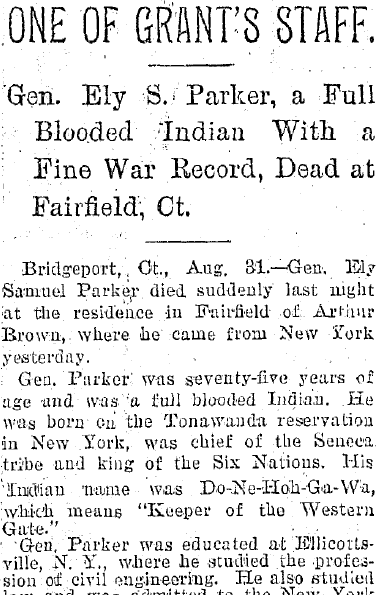
Today Appomattox Court House, Virginia, and the McLean House are part of our National Parks system and well worth a visit.
Read More Articles about the Civil War:
